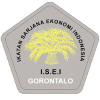Pengaruh Literasi Keuangan Terhadap Perilaku Inovasi Produk Hijau dan Inovasi Proses Hijau di Moderasi Gender Pada Usaha Kecil dan Menengah di Boyolali
Abstract
Financial literacy is a strategic issue that has increasingly gained attention in various economic studies, particularly in relation to strengthening the innovative capacity of business actors. However, empirical studies linking financial literacy to green innovation behavior, especially in the context of Micro, Small, and Medium Enterprises (MSMEs), remain limited. This study aims to: (1) analyze the influence of financial literacy on green product innovation behavior among MSMEs in Boyolali Regency; (2) examine the effect of financial literacy on green process innovation behavior; and (3) investigate the role of gender as a moderating variable in the relationship between financial literacy and both types of innovation. A quantitative approach is employed in this research through a survey method involving 397 MSME actors selected using accidental sampling. Data were collected using an online questionnaire distributed via the Google Forms platform. Validity testing was conducted using convergent and discriminant validity approaches, while reliability was measured through Cronbach’s Alpha and composite reliability. Data analysis includes descriptive statistics, multicollinearity testing, goodness-of-fit testing, and moderating regression analysis. The results indicate that: (1) financial literacy has a positive and significant influence on green product innovation; (2) financial literacy also significantly enhances green process innovation; and (3) gender plays a significant moderating role in strengthening the relationship between financial literacy and both types of green innovation. These findings not only enrich the literature from the perspective of Human Capital Theory but also provide practical implications for enhancing the innovative capacity of MSMEs in the face of sustainable development challenges.
Keywords
Full Text:
PDFReferences
Huang, J., & Li, Y. (2019). Financial literacy and small and medium enterprises' proactive adoption of green product innovation. Journal of Cleaner Production, 215, 1-11. https://doi.org/10.1016/j.jclepro.2019.01.050
Husnaini, W., & Tjahjadi, B. (2021). Quality management, green innovation and firm value: Evidence from indonesia. International Journal of Energy Economics and Policy, 11(1), 255–262. https://doi.org/10.32479/ijeep.10282
Kim, S., Lee, J., & Park, M. (2020). The impact of financial literacy on sustainable investment decisions: Examining the role of gender in promoting environmental responsibility. Sustainable Development, 28(4), 1-13. https://doi.org/10.1002/sd.1996
Lee, J., & Park, H. (2019). Enhancing managerial capabilities through financial literacy and education: A human capital approach to sustainable and green innovation. Journal of Business Ethics, 158(2), 1-16. https://doi.org/10.1007/s10551-017-3676-8
Li, X., Zhang, Y., & Chen, J. (2021). Eco-friendly product innovation: Developing goods and services to minimize environmental impact and support sustainable business practices. Journal of Environmental Management, 295, 1-12. https://doi.org/10.1016/j.jenvman.2021.113187
Nurbaeti, I., Mulyati, S., & Sugiharto, B. (2019). The Effect of Financial Literacy and Accounting Literacy to Enterpreneurial Intention Using Theory Of Planned Behavior Model. Accounting Research Journal Os Sutaatmadja (Accruals), 1(1), 1–19. https://doi.org/10.2011/ij180102137
Pallagst, K., Vargas-Hernández, J., & Hammer, P. (2019). Green innovation areas—en route to sustainability for shrinking cities? Sustainability, 11(23), 6674. https://doi.org/10.3390/su11236674
Park, H., & Kim, S. (2020). Exploring the role of financial literacy in fostering innovation among SMEs: A human capital perspective. Journal of Small Business and Enterprise Development, 27(3), 1-15. https://doi.org/10.1108/JSBED-08-2019-0255
Survei Nasional Literasi dan Inklusi Keuangan (SNLIK) tahun 2022
Wang, S., Li, Q., & Zhang, T. (2019). Integrating sustainability values into business operations: Balancing economic value creation with environmental responsibility. Journal of Business Ethics, 158(4), 1-18. https://doi.org/10.1007/s10551-017-3747-0
Wicaksana, I., & Primadhita, Y. (2022). Model Ecopreneur dengan Mediasi Inovasi Hijau terhadap Kinerja Berkelanjutan Usaha Mikro Kecil Menengah (UMKM) Agribisnis ( Ecopreneur Model using Green Innovation Mediation on Sustainable Performance of Agribusiness SMEs ). Prosiding Manajerial Dan Kewirausahaan VI, 6. https://doi.org/10.220956/jPj
Yoshino, N., & Hesary, F. T. (2019). The role of financial literacy in promoting the adoption of green technology in production processes. Journal of Sustainability Finance & Investment, 9(2), 1-18. https://doi.org/10.1080/20430795.2019.1619740
Zhang, X., Li, Y., Wang, J., & Liu, M. (2020). Pollution prevention as a proactive approach to environmental protection: Strategies, practices, and sustainable impacts. Environmental Management, 56(3), 1-15. https://doi.org/10.1007/s00267-020-01266-4
DOI: https://doi.org/10.37479/jeej.v7i3.28066
Refbacks
- There are currently no refbacks.
Copyright (c) 2025 Rosa Zulfah Ashari, Muhammad Sabandi

This work is licensed under a Creative Commons Attribution-ShareAlike 4.0 International License.
Jambura Economic Education Journal has been indexed:
PUBLISHED BY :
Prodi Pendidikan Ekonomi Fakultas Ekonomi
Universitas Negeri Gorontalo, Indonesia


















